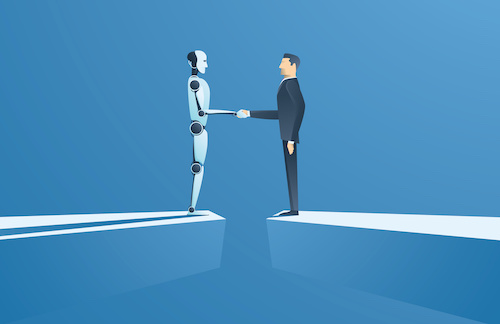Key points:
- Students’ exposure to generative AI can make a difference in their future success
- Get the latest on AI in Education
- Crafting ethical AI landscapes in K-12 education
- For more news on AI in education, visit eSN’s Digital Learning hub
With the rapid rise of generative AI, nearly one in two high school students polled think the workforce as we know it today will undergo a major transformation, a new global survey shows.
More than 48 percent of those queried believe that hard skills will become less important and soft skills, such as reasoning and creativity, will increase in demand, according to the survey, conducted in March by Philadelphia-based Society for Industrial and Applied Mathematics (SIAM).
As a result, 28 percent of the students said workers will need to acquire new skills to thrive in the new AI workplace, and more than two thirds are looking to their schools to help position them for future success.
The survey polled 825 11th and 12th grade students from across the U.S. and sixth form students in England and Wales to get their insights on the impact of generative AI on their academics and future careers. The 16- to 18-year-old students queried are participants in this year’s MathWorks Math Modeling Challenge (M3 Challenge), an annual internet-based, intensive math modeling contest organized by SIAM.
When asked what best reflects their thoughts about generative AI, the majority (47 percent) stated they worry that it will be difficult for students of the future to reach their full potential in a generative AI world, relying on technology more than their own capabilities. About 40 percent said generative AI will change the world as we know it today, impacting almost every industry and career, and that it will be increasingly important to master generative AI tools to succeed academically and in the future workforce.
Nearly half of the students polled expressed some degree of concern about potential loss of jobs in the future workforce due to certain roles becoming automated or obsolete. Only 19 percent think the AI workforce of the future will deliver greater productivity as people work faster and smarter.
“The survey demonstrates that many students feel that they need to take steps now to prepare for an evolving workplace,” said Dr. Karen Bliss, Senior Manager of Education and Outreach at SIAM.
Schools can do more
To that end, Bliss explained that most survey respondents are looking to their schools for help and guidance, with 68 percent saying their school isn’t doing enough to prepare students for the future world of AI.
How can high schools prepare students for the future world of AI? The majority (62 percent) of those queried suggested that schools offer guidance on the ethics of using AI, including boundaries related to AI content creation, misuse, and plagiarism.
Other recommendations included having schools provide practical training on how to most effectively use generative AI tools for academics (58 percent), teach the limitations of AI as it relates to academics (41 percent), and help identify careers that may be–or are less likely to be–disrupted by AI so students can plan their future academics accordingly (38 percent).
“Interestingly, one in five students would like to see schools offer extracurricular activities to boost their AI skills and experience, while almost as many think it would be helpful if teachers make using generative AI tools mandatory in assignments,” Bliss said.
Other survey findings
With many mathematics teachers grappling with the place of generative AI in math class, the survey asked respondents for their thoughts on this topic. Almost half (46 percent) said they think mathematics skills will become more important with the growth of generative AI, while 26 percent stated that they don’t think it will have much effect.
Of the students that predicted mathematics skills will increase in importance in the future, 68 percent explained that effective use of AI still requires human reasoning and those with a good grasp of math are more apt to succeed. Others said that as the AI field continues to grow, there will be more demand for mathematicians to develop AI tools and systems (56 percent) and that data analysis is an important part of using AI, a skill honed by mathematics studies (52 percent).
“With the fast emergence of AI tools, these are exciting times in mathematics and computer science since we will be able to tackle a broader range of problems more efficiently,” said Dr. Kathleen Kavanagh, Director of the Institute for STEM Education at Clarkson University and an M3 Challenge judge. “AI can certainly help with some tasks, but it cannot replace critical thinking, logical reasoning, creativity, and problem-solving skills. Now more than ever, students need to pay attention in math classes and build those skills so that they can successfully navigate in a complex, rapidly changing world.”
This press release originally appeared online.
- 5 digital resources to inspire curiosity and engage students - April 30, 2024
- Critical steps to help school districts combat ransomware attacks - April 30, 2024
- Empowering girls with STEM education to build tomorrow’s tech industry - April 29, 2024

